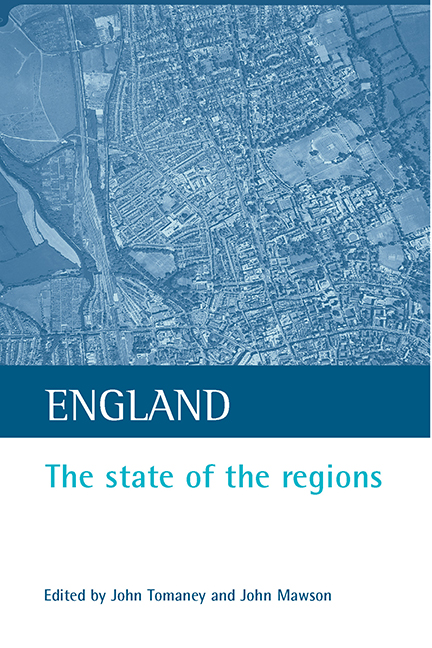Book contents
- Frontmatter
- Contents
- List of tables and figures
- Acknowledgements
- List of contributors
- one Introduction
- two Regional government in England: reviewing the evidence base
- three New Labour and the evolution of regionalism in England
- four Yorkshire (and the Humber)
- five Institutional collaboration in the West Midlands region
- six England's North West
- seven The South West
- eight Regionalism in the East of England
- nine The South East region?
- ten Regionalism in North East England
- eleven Regional strategy development in the East Midlands
- twelve The problem of regional governance
- thirteen Elected regional government: the issues
- fourteen Barnett plus needs: the regional spending challenge in Britain
- fifteen Conclusion: prospects for regionalism
- Index
- Also available from The Policy Press
six - England's North West
Published online by Cambridge University Press: 20 January 2022
- Frontmatter
- Contents
- List of tables and figures
- Acknowledgements
- List of contributors
- one Introduction
- two Regional government in England: reviewing the evidence base
- three New Labour and the evolution of regionalism in England
- four Yorkshire (and the Humber)
- five Institutional collaboration in the West Midlands region
- six England's North West
- seven The South West
- eight Regionalism in the East of England
- nine The South East region?
- ten Regionalism in North East England
- eleven Regional strategy development in the East Midlands
- twelve The problem of regional governance
- thirteen Elected regional government: the issues
- fourteen Barnett plus needs: the regional spending challenge in Britain
- fifteen Conclusion: prospects for regionalism
- Index
- Also available from The Policy Press
Summary
Introduction – a fragmented region?
The North West is England's second largest region with a population of seven million, or 12% of the total UK population. This means that it is comparable in size to Scotland and Wales combined, and has more inhabitants than four European Union (EU) member states – Denmark, Finland, Ireland and Luxembourg (Jarvis and McNamara, 1999). Due to its size, therefore, the North West clearly occupies an important position in the regional landscape of England. As this chapter explores, from the 1980s onwards there was a crystallisation of public and private sector interests at the regional level in the North West, which saw the creation of various institutions aimed at promoting regional coherence. More recently, of course, with the creation of the North West Development Agency (NWDA) and the North West Regional Assembly (NWRA), the region has been able to build upon these earlier developments. However, as this chapter goes on to discuss, it would seem there is still a degree of ambivalence, within the region, about its role in what is the emerging mosaic of English regional devolution.
There are several reasons for this. Firstly, the North West region, which stretches from Crewe in the south to Carlisle in the north, is probably one of the most fragmented in England (Bristow, 1987). Of course, this is certainly not unique to the North West, since the majority of the English regions have (at least for the moment) distinctly artificial boundaries. However, it must be said that in the North West this problem is accentuated because of its particular geographical location, which includes the counties of Cheshire, Greater Manchester, Merseyside, Lancashire and Cumbria. In particular, the ‘Cumbrian Question’ is a particularly intractable one for the region because of its proximity and its historical allegiance to the North East and Scotland. Put simply, Carlisle is much closer to both Newcastle and Glasgow than it is to either Manchester or Liverpool. Similarly, there is a strong case for including the district of High Peak which, administratively speaking, lies in Derbyshire but is clearly a part of the Greater Manchester travel-to-work area (Burch and Holliday, 1993).
- Type
- Chapter
- Information
- EnglandThe State of the Regions, pp. 81 - 94Publisher: Bristol University PressPrint publication year: 2002



